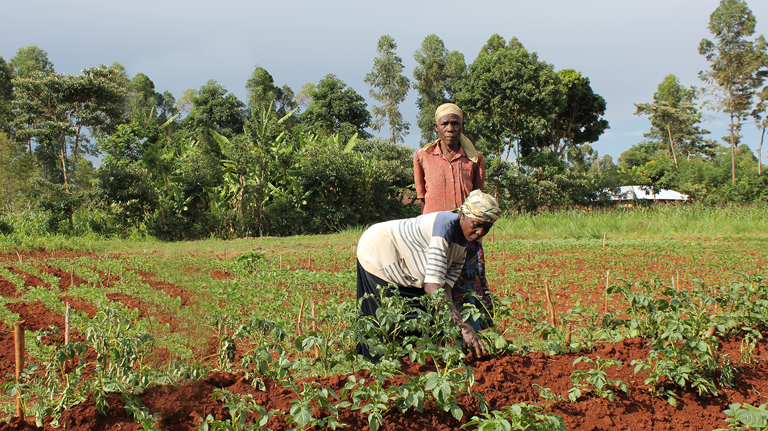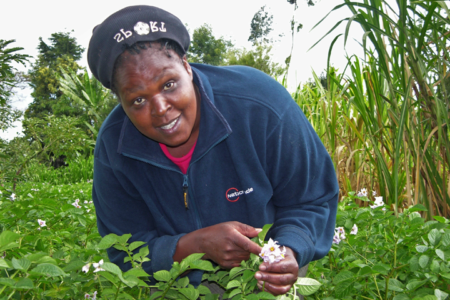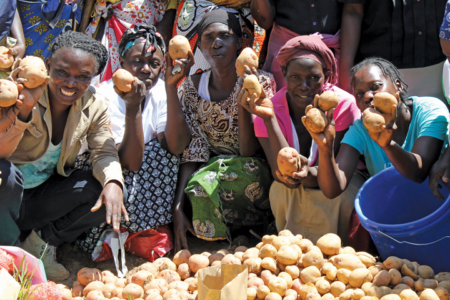
Farmer capacity building and institutional support for sustainable potato production and commercialization.
In Cameroon, potato is viewed as a useful food security and cash crop, but farmers face multiple productivity constraints. This project aims to increase food security, nutrition, and incomes by improving farmers’ access to quality planting materials and training stakeholders on sustainable production, seed multiplication and marketing within an overall national potato strategy.
Background
Potato is a priority food crop becoming increasingly popular as a food security and cash crop in Cameroon, a country where 60% of the active population are farmers. Maturing in just three to four months, potato is recognized as offering a quick return on investment in land and labor. It is a nutritious crop that contributes to a healthy and diverse diet, providing good levels of zinc, iron, potassium, folic acid and vitamin C. Rich in carbohydrates, it also provides a valuable source of dietary energy.
Estimates put annual demand for potato in Cameroon at approximately one million tons. However, the country currently produces less than a third of this amount, with more than half exported to neighboring countries. Cameroon is the only country in the region with significant production potential. The challenge, therefore, is to tap into this unexploited potential to increase potato production and create new livelihood opportunities.
This project builds on the experience of the International Potato Center (CIP) globally to address the constraints to potato productivity in developing countries. It will strengthen the capacity of institutions and other actors to provide quality planting materials, decentralized seed systems, pest and disease management, and good agricultural practices, as well as novel training methodologies designed to share knowledge widely among farmers and other stakeholders.
Objectives
- Facilitate stakeholder sensitization and engagement for developing and implementing a sustainable national potato strategy;
- Build the capacity of trainers, extension staff, and farmers in sustainable good agricultural practices, innovative and agro-ecological farming methods, and on-farm business;
- Establish a sustainable national seed system to improve access for farmers and cooperatives to quality seed of disease-resistant and marketdemanded varieties;
- Promote the use of innovative and resource-saving cropping, storage, and marketing methods; and
- Establish a monitoring and evaluation system to collect and document progress and achievements.
Approach
The project has begun working with Cameroon’s Ministry of Agriculture and Rural Development (MINADER) and other partners to improve the potato sector policy framework and help development of a national potato strategy. Working through farmer-field and farmerbusiness school approaches, selected individuals are trained to deliver information to farmer groups. The project also supports the production of disease-free planting materials through the establishment of a sustainable seed system and facilitates the establishment of public-private partnerships to multiply and supply quality seed potatoes.
The project works with partners to build and strengthen in-country capacity to produce early generation seed through tissue culture and rapid multiplication in screenhouses. Capacity for local seed production will be built by backstopping the existing and emerging seed production facilities and using model farmers who will establish businesses and acquire funding through microfinance institutions. Finally, it will be important to strengthen farmer groups and other producer organizations, empowering smallholders and creating jobs for youth in the potato sector.
Expected outcomes
Work to improve the policy and legal framework includes the development of a 10-year national potato strategy and the establishment of a national stakeholder platform. With support from the government, these activities seek to create an environment conducive to more investments in public-private partnerships.
Adopting a ‘training of trainers’ approach, coupled with the Cluster-Based Farmer Field Schools (CBFFS), the project expects to develop the capacities of strategic partners and at least 40 model farmers with enhanced knowledge on sustainable intensification of potato farming, innovative water-use technologies, basic mechanization, improved post-harvest storage and the market potential of new varieties. The farmer field schools, farmer-run field schools, and farmer business schools are expected to increase yields and incomes by at least 35% of 74,000 small-scale farmers, as well as generate employment along the value chain. Enhanced and sustainable availability of planting materials will be ensured through training and increasing local capacity to produce clean seed and conduct field multiplication in close collaboration with the Institute of Agricultural Research and Development (IRAD). At least 14 cooperatives/farmer groups will be selected and backstopped, with business models established to ensure new businesses can attract start-up finance.
| Key outcome | Targets |
| Farmers adopting improved agricultural practices | 74,000 |
| National seed potato production capacity increase (Second field generation seed or G2) | 500 tons |
| Area to be planted with improved potato (G2) | 250 hectares |
| New potato varieties released | 2 |
| Increase in farmer cooperatives members’ profits | 40% |
Contact
Dieudonné Harahagazwe
Project Coordinator • CIP, Cameroon
d. harahagazwe@cgiar.org
Thanks to our donors



